
The Bank of England expects growth this year to be the slowest since 2009 when the economy was in recession.
It is forecasting growth of 1.2% this year, down from its previous forecast of 1.7% made in November.
The Bank said it had seen further evidence that businesses were being cautious in the run-up to Brexit, including evidence from its own survey of firms.
As expected the Bank kept interest rates on hold at 0.75%.
The Bank put the fall in growth down to a decline in business investment and housebuilding, as well as a halving of the growth rate in exports.
The UK was also being hit by slower-than-expected growth in the eurozone and China, the Bank said in its Quarterly Inflation Report.
"Growth appears to have slowed at the end of 2018 and is expected to remain subdued in the near term," it said.
The Bank even sees a one-in-four chance of the economy slipping into recession in the second half of this year.
Brexit stalemate scars prosperity, says Bank
What did the Bank say about Brexit?
There has been an "intensification" of Brexit uncertainties, the Bank said.
Its survey of 208 firms showed that half had started putting plans in place for a no-deal Brexit. The survey also showed that a fifth had taken on extra warehouse space.
It also noted a sharp fall in business investment at the end of last year.
"Uncertainty appears to have risen recently, and may have weighed on investment by more than had been expected in August," the Bank said.
Bank of England Governor Mark Carney said: "The fog of Brexit is causing short term volatility in the economic data, and more fundamentally, it is creating a series of tensions in the economy, tensions for business."

Bank of England, Agency for Scotland
The Bank of England is the central bank of the United Kingdom. Sometimes known as the “Old Lady” of Threadneedle Street, the Bank was founded in 1694, nationalised on 1 March 1946, and in 1997 gained operational independence to set monetary policy.






























